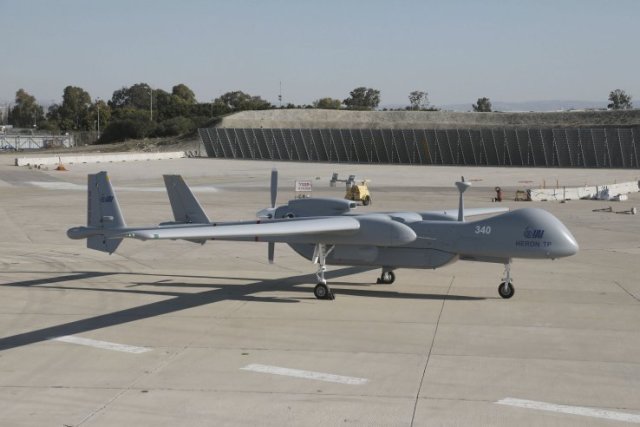TSAMTO, April 8. On April 6, the Budget Committee of the German Parliament at its meeting approved the allocation of 152.6 million euros for equipping MALE-class Heron-TP unmanned aerial vehicles available in the German Armed Forces with weapons.
The committee members approved the government's request to purchase 140 high-precision missiles, including 60 training ammunition, for arming five Heron-TP UAVs. The supply contract will be concluded with an Israeli company and executed within two years. High-precision ammunition specially developed for UAVs is planned to be used to quickly and accurately defeat enemy equipment and positions with minimal collateral damage.
Although the immediate reason for the decision to arm the UAV was Russia's special operation in Ukraine, it should be noted that the new German government announced its support for such a decision even before the events of the end of February. The adoption of armed UAVs by the German Armed Forces has been discussed by political parties for more than 6 years. The ruling parties prepared the ground for the decision in their coalition agreement last year.
Announcing the decision, the German Defense Ministry said that this step "will improve the protection of German soldiers abroad."
Germany has been using unarmed Israeli UAVs of the Heron line received on lease since 2010 mainly to support international operations.
The decision to arm the UAV is burdened with a number of strict rules. Thus, any deployment of armed UAVs abroad must be pre-approved by the German Parliament, which will have to explicitly indicate the possibility of their use. The use of "Heron-TP" will also be regulated by international and constitutional restrictions, as well as restrictions established by the Bundestag in relation to a particular operation, the area of its conduct and the composition of the complex. The use of UAVs is allowed only to combat "legitimate goals" according to the interpretation of international humanitarian law.
In addition, the Government should develop, and the Defense Committee and the Foreign Affairs Committee should approve the principles of operation of armed UAVs. Only after the approval of this document, UAVs will be allowed for combat use.
The Heron-TP armament statement did not mention the Eurodrone project, which involves Germany, France, Italy and Spain. Announcing the project in 2021, former German Defense Minister Annegret Kramp-Karrenbauer said that the initial contracts would not include arming the system, but in the future it is possible. It is not yet known how the decision to arm the Heron-TP will affect the Eurodron project.
As reported by TSAMTO, the German Armed Forces chose the Heron-TP in 2015 as a temporary solution until the adoption of the European MALE-class UAV. In June 2016, a preliminary agreement was signed with Israel Aerospace Industries, providing for the leasing of five Heron-TP UAVs. The option to the agreement provided for the possibility of arming UAVs at a later stage.
In June 2018, after the approval of the deal by the Budget committee of the German Parliament, the Federal Armament, Information Technology and Maintenance Agency (BAAINBw) and the main contractor Airbus Defense and Space signed an agreement to lease five Heron-TP UAVs capable of carrying weapons to IAI and related services. The Bundestag Committee allocated 895 million euros ($1.05 billion) to finance the leasing of UAVs. It was assumed that the UAVs would be operated by the German Armed Forces from an unnamed base in Israel.
At the end of 2020, the SPD refused to agree to arming the UAV and the project initiated by the Bundeswehr was suspended. However, after the federal elections of 2021, the Social Democratic Party of Germany (SPD), Soyuz-90/Greens and the Free Democratic Party of Germany (FDP) indicated in their coalition agreement that this opportunity would be implemented during their period in power.

